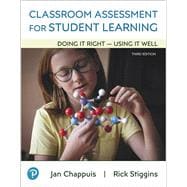Classroom Assessment for Student Learning helps readers gather accurate information about students’ achievement and use the assessment process and its results effectively to improve achievement. This user-friendly guide is full of practical tips, activities, and real-world examples of what assessment for learning looks like in today’s classrooms.
The 3rd Edition continues to focus on five keys to quality classroom assessment, with an enhanced emphasis on the formative use of classroom assessment results. The keys help readers 1) establish a clear assessment purpose to meet the information needs of all intended users; 2) base instruction and assessment on clear learning targets; 3) design or select all assessments to meet standards of accuracy; 4) communicate summative and formative results effectively; and 5) involve students in the assessment process and in using results to further learning.
Also available with the Enhanced Pearson eText*
The Enhanced Pearson eText is:
- Engaging. The new interactive, multimedia learning features were developed by the authors and other subject-matter experts to deepen and enrich the learning experience.
- Convenient. Enjoy instant online access from your computer or download the Pearson eText App to read on or offline on your iPad® and Android® tablet.**
- Affordable. Experience the advantages of the Enhanced Pearson eText along with all the benefits of print for 40% to 50% less than a print bound book.
*The Enhanced eText features are only available in the Pearson eText format. They are not available in third-party eTexts or downloads.
**The Pearson eText App is available on Google Play and in the App Store. It requires Android OS 3.1-4, a 7” or 10” tablet, or iPad iOS 5.0 or later.
Note: You are purchasing a standalone product; the Enhanced Pearson eText does not come packaged with this content. Students, if interested in purchasing this title with the Enhanced Pearson eText, ask your instructor to confirm the correct package ISBN and Course ID. Instructors, contact your Pearson representative for more information.
If you would like to purchase both the physical text and Enhanced Pearson eText search for:
0135178983 / 9780135178980 Classroom Assessment for Student Learning: Doing It Right - Using It Well Plus Enhanced Pearson eText -- Access Card Package
Package consists of:
- 0134899164 / 9780134899169 Classroom Assessment for Student Learning: Doing It Right - Using It Well, Pearson eText -- Access Card
- 0135185572 / 9780135185575 Classroom Assessment for Student Learning: Doing It Right - Using It Well
Jan Chappuis, educator and author, joined Rick Stiggins at the Assessment Training Institute in Portland, Oregon, in 2001. Prior to that she had been an elementary and secondary teacher as well as a curriculum developer in English/language arts, mathematics, social studies, and world languages.
For over 25 years, she has written books and developed workshops on classroom assessment literacy, presenting both nationally and internationally. She is recognized as a national thought leader in the area of formative assessment for her work in translating research into practical classroom applications. She is the author of Seven Strategies of Assessment for Learning (2015), Learning Team Facilitator Handbook (2007), and co-author of Creating and Recognizing Quality Rubrics (2006), Classroom Assessment for Student Learning: Doing It Right–Using It Well (2012), and Understanding School Assessment– A Parent and Community Guide to Helping Students Learn (2002).
Richard Stiggins founded the Assessment Training Institute in Portland, Oregon, in 1992 to provide professional development for educators facing the challenges of day-to-day classroom assessment.
Dr. Stiggins received his bachelor’s degree from the State University of New York at Plattsburgh, master’s degree in industrial psychology from Springfield (MA) College, and doctoral degree in education measurement from Michigan State University. Dr. Stiggins began his assessment work on the faculty of Michigan State before becoming a member of the faculty of educational foundations at the University of Minnesota, Minneapolis. In addition, he has served as director of test development for the ACT, Iowa City, Iowa; as a visiting scholar at Stanford University; as a Libra Scholar, University of Southern Maine; as a director of the Centers for Classroom Assessment and Performance Assessment at the Northwest Regional Laboratory, Portland, Oregon; and as a member of the Lewis and Clark College, Portland.

